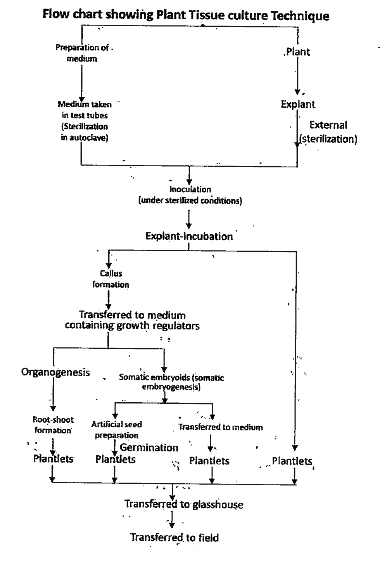Describe the tissue culture. technique and, what are the advantages of tissue culture over conventional method of plant breeding in crop improvement programmes ? Solution in Telugu
The technique of growing, culturing and maintaining plant cells, tissues and organs in vitro is called tissue culture. Tissue culture is done by following methods:
1) Preparation of nutrient culture medium,
The nutrient medium must provide a carbon source such as sucrose and also inorganic salts, vitamins, aminoacids and growth regulators like auxịns, cytokinins, etc.
2) Sterilization of the culture imdium:
a) The medium is rich in nutrients and therefore, attracts the growth of microorganisms. The medium should be sterilized
b) Sterilization is carried out in a steam sterilizer called autoclave.
c). The culture medium-is autoclaved for 15 min, at 121∘C and 15 /bs pounds of pressure.
3) Preparation of explant : Any part of the plant used as inoculum is called explant.
4) Inoculation of explants :
The transfer of explants on to the sterilized nutrient culture .medium is called inoculation and is carried out in an aseptic condition.
5) Incubation of growth :
a) The cultures are incubated for 3 to 4 weeks during which period the cells of the explant absorb the nutrients, grow and undergo repeated divisions to produce undifferentiated mass of cells known as Callus.
b) Sometimes sheets or roots may be produced directly.
c) the explants or callus cultured on different combinations of auxins and cytokinins will produce shoots or roots and this process is called organogenesis.
d) Alternately, embryo like structures develop from the callus and this phenomenon is known as-somatic embryogenesis, the embryo-like. structure which develop from the callus are called embrjoids. Since these embryoids develop from somatic tissue they are also called Somatic embryos.
6) Acclimatization of plantlets and transfer to pots : The plants generated through organogenesis (or) somatogenesis need to be acclimatized-before they are transferred to pots
Advantages of tissue culture,
1) More number of plants can be produced in a short time.
2) Disease free plants can be developed from diseased plants.
3) Seedless plants can be multiplied.
4) Female plants are selectively produced through tissue culture .
5) Somatic hybrids can be raised by tissue culture, where sexual hybridization is not possible.

Topper's Solved these Questions
Similar Questions
Define and explain water potential.
View SolutionDescribe the structure of the heart of a man. Draw a neat labelled diagram of it.
View SolutionGive an account of glycolysis, Where does it occur ? What are the end products? Trace the fate of these products in both aerobic, and anaerobic respiration.
View Solutionwhat are the advantages of tissue culture methods over conventional programmes ?
View SolutionDescribe in brief tissue culture technique.
View SolutionWhat is 'tissue culture ' ? Describe the methodology of tissue culture .
View Solutionwhat are the aims of plant tissue culture techniques?
View SolutionAssertion (A) : Tissue culture techniques are used for commercial production of plants. Reason (R) : Tissue culture techniques are used for plant research.
View SolutionWrite the technique of plant tissue culture.
View SolutionWhat is tissue culture? Write the advantages of tissue culture.
View Solutionwhat are the advantages of tissue culture methods over conventional programmes ?
View SolutionHow is tissue culture method useful for crop improvement?
View SolutionWhat are the advantages of tissue culture methods over conventional method of plant breeding in crop improvement programmes ?
View SolutionDescribe in brief the steps of plant tissue culture techniques.
View SolutionWhat are the advantages of tissue culture?
View SolutionPlant Tissue Culture || Technique OF Plant Tissue Culture
View Solution
